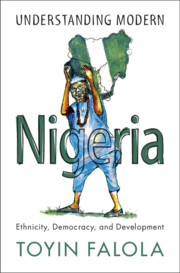Book contents
- Understanding Modern Nigeria
- Understanding Modern Nigeria
- Copyright page
- Dedication
- Contents
- Figures
- Maps
- Preface
- Acknowledgments
- Part I Introduction
- Part II Context and History
- Part III Democracy and Governance
- 7 Ethnicities and Political Identities
- 8 Religion and Geopolitics
- 9 Democracy and Its Limits
- 10 Governance, Citizenship, and the State
- Part IV Development Crises
- Part V Reforms and Revolutions
- Part VI Conclusion
- Bibliography
- Index
10 - Governance, Citizenship, and the State
from Part III - Democracy and Governance
Published online by Cambridge University Press: 09 June 2021
- Understanding Modern Nigeria
- Understanding Modern Nigeria
- Copyright page
- Dedication
- Contents
- Figures
- Maps
- Preface
- Acknowledgments
- Part I Introduction
- Part II Context and History
- Part III Democracy and Governance
- 7 Ethnicities and Political Identities
- 8 Religion and Geopolitics
- 9 Democracy and Its Limits
- 10 Governance, Citizenship, and the State
- Part IV Development Crises
- Part V Reforms and Revolutions
- Part VI Conclusion
- Bibliography
- Index
Summary
“Governance, Citizenship, and the State” examines the efficacy and effectiveness of governance in relation to the discourses of inclusivity, marginalization, discrimination, poverty, development, growth, war, tranquility, politics, inflation, deflation, debt, death rates, birth rates, environmental conditions, security, human development capacity, fundamental human rights, etc. These notions are viable means of assessing the pros and cons in any society’s system of governance, as well as the extent to which ideas of governance have been collectively domesticated by the state and its people. Human society has evolved through several mechanisms of governance, from monarchy to other forms. Despite society’s evolution from predominately religious governments to embrace secular bureaucracies, the rules governing behavior remain largely drawn from religious tenets. At the core of any inquiry into governance is the question of morality vis-à-vis the promotion of common humanity and justice. Hence, by considering what governance portends and its implications over time, one can begin to understand the roots of modern governance and the Nigerian experience.
Keywords
- Type
- Chapter
- Information
- Understanding Modern NigeriaEthnicity, Democracy, and Development, pp. 243 - 266Publisher: Cambridge University PressPrint publication year: 2021

